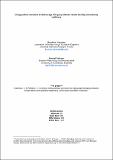Files in this item
Using political sanctions to discourage intergroup attacks : social identity and authority legitimacy
Item metadata
| dc.contributor.author | Urbanska, Karolina | |
| dc.contributor.author | Pehrson, Sam | |
| dc.date.accessioned | 2020-02-13T16:35:42Z | |
| dc.date.available | 2020-02-13T16:35:42Z | |
| dc.date.issued | 2019-08-13 | |
| dc.identifier | 257678666 | |
| dc.identifier | f0c25cce-bf20-48e2-92e8-f2bea641323d | |
| dc.identifier | 85071291196 | |
| dc.identifier | 000481414600028 | |
| dc.identifier.citation | Urbanska , K & Pehrson , S 2019 , ' Using political sanctions to discourage intergroup attacks : social identity and authority legitimacy ' , Behavioral and Brain Sciences , vol. 42 , e143 . https://doi.org/10.1017/S0140525X1900075X | en |
| dc.identifier.issn | 0140-525X | |
| dc.identifier.other | ORCID: /0000-0002-9259-6408/work/60631206 | |
| dc.identifier.uri | https://hdl.handle.net/10023/19452 | |
| dc.description.abstract | De Dreu and Gross offer novel solutions to discouraging attackers via political sanctions. We offer insights from social psychological and criminological research on when such sanctions would work and when they could backfire. We argue that the influence of such sanctioning ultimately rests upon the extent to which such authorities can claim to represent the society they serve. | |
| dc.format.extent | 52328 | |
| dc.language.iso | eng | |
| dc.relation.ispartof | Behavioral and Brain Sciences | en |
| dc.rights | Copyright © Cambridge University Press 2019 . This work has been made available online in accordance with the publisher’s policies. This is the author created, accepted version manuscript following peer review and may differ slightly from the final published version. The final published version of this work is available at https://doi.org/10.1017/S0140525X1900075X | en |
| dc.subject | BF Psychology | en |
| dc.subject.lcc | BF | en |
| dc.title | Using political sanctions to discourage intergroup attacks : social identity and authority legitimacy | en |
| dc.type | Journal item | en |
| dc.contributor.institution | University of St Andrews.School of Psychology and Neuroscience | en |
| dc.identifier.doi | 10.1017/S0140525X1900075X | |
| dc.description.status | Non peer reviewed | en |
| dc.date.embargoedUntil | 2020-02-13 | |
| dc.identifier.url | https://doi.org/10.31234/osf.io/vbqxk | en |
This item appears in the following Collection(s)
Items in the St Andrews Research Repository are protected by copyright, with all rights reserved, unless otherwise indicated.

